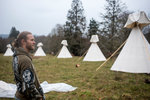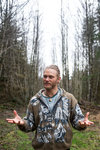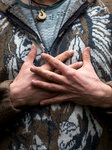




MINERAL — The Oklevueha Native American Church of Ayahuasca Healings is open in East Lewis County and eager to serve its growing flock of parishioners.
The newly founded enterprise, which offers its guests an opportunity to partake in the hallucinogenic Ayahuasca and Huachuma cactus teas, has so far run three retreats with a total of 32 paying visitors seeking what the owners call vision quests.
During a visit to the sprawling church property on Thursday, Marc Shackman, the CEO and “head medicine man,” or shaman, of the church, noted that the fourth retreat was scheduled to take place today and Sunday.
Shackman, 35, is a native of Kent, England. He has traveled the world and has now wound up nestled in the shadow of Mount Rainier as an unconventional church leader. The drugs used as part of his church’s religious ceremonies are considered Schedule 1 controlled substances by the federal government, but there is some legal precedent for religious protections for churches such as the Church of Ayahuasca Healings, which is the first to open in America.
Some churches have even been granted permits to operate by the Drug Enforcement Administration. The Church of Ayahuasca Healings is not among those churches, but that is not stopping Shackman and crew from moving forward with their mission.
“We’re trying to figure this out as we go along,” said Shackman, who expressed a willingness to work with the DEA. “That’s where the trust comes in.”
Shackman added that DEA certification typically comes after a church wins a costly and time-consuming court case against the government.
“If we went through a court case we’d win too, but we’re trying to avoid that,” he told The Chronicle.
The church recently sent a letter to the Lewis County Prosecutor’s Office prior to its first open ceremony in an attempt to establish a working, or at least understanding, relationship between the two parties.
“I wanted to make sure they received our letter before we started,” said Shackman.
The letter arrived only two days prior to the first retreat; but still, Shackman says, “We have nothing to hide.”
Lewis County Prosecutor Jonathan Meyer said recently that he believes the church’s position would be upheld in 99 of 100 court verdicts.
The church, located on 160 acres of bucolic retired ranch land near the border of Lewis and Pierce counties, is an independent branch of the Oklevueha Native American Church.
One accusation pointed at the church in Mineral is that they are not practicing an actual Native American religion, and moreover, the church’s owners and head spiritual leaders are not actual Native Americans.
This is not a barb that bothers Shackman much. He noted that the church shuttles in a Native American elder to run their ceremonial sweat lodge each weekend.
“And we are going to be working with more and more elder Native Americans as we go along,” he said.
What’s more, Shackman does not feel that there is a standard of ethnic authenticity required to freely practice religion in the United States.
“You’re given permission by the spirit to do what we do and a lot of people can’t understand that,” Shackman said. “The way I like to look at it is we are all Native Americans in our hearts.” It’s not “a tribe, or skin color,” issue, he said.
“The overall mission is global,” Shackman said. “What it really comes down to is the human right to practice your religion how you like when it does so with respect and in a sacramental way.”
The setting of the church is majestic, with a creek winding through the front pasture and an intricate trail system leading up a wooded hillside to views that cast across the Cascade foothills.
The peak of Mount Rainier is said to be visible on sunny days. The church began moving onto the property in December of 2015 after an extensive search for a suitable location, and they currently have about nine months left on their lease.
Shackman says there is a possibility of purchasing the property in the future since he considers the location perfect due to its natural setting, lack of neighbors, proximity to town for supplies and its broadband connection.
Four members of the church, including a medicine woman and her 8-month-old baby, live in a farmhouse on site, and another three or four volunteers live in shacks and tents around the property.
During ceremonial retreats, the guests are housed two to a teepee by the creek. The seventh teepee was receiving its finishing touches during The Chronicle’s visit on Thursday, and the plan is to build a similar “volunteer teepee village” in an adjacent pasture.
Volunteers are asked to stick around for a three-month commitment, but that does not appear to be a strict requirement.
Mark Robilliard, 38, of Portland, said he came to the church when he “needed to change his headspace and heart space.”
Robilliard, a self-described jack of all trades, was busy finishing a teepee on Thursday, but he took time off from his duties recently to participate in the mind-altering religious sacrament of the church. He came away impressed.
“Regardless of your expectations coming in, whether you expect everything or nothing, the plant will always give you what you need,” said Robilliard. “So even if people don’t get their grand experience wind up taking something positive away from it.”
Robilliard said he had experimented with similar substances before but compared it to “kind of fumbling around in the dark,” compared with his illuminative experience at the Ayahuascas Healings Church.
Despite his positive experience, Robilliard, who arrived at the church in early January and traveled back to Portland on several occasions since, said that he is unlikely to stick around for the full three-month volunteer stint, citing his desire to be closer to his romantic partner and family.
Some people outside of the church have made claims that it is operating as a sort of cult. According to Shackman, the freedom to come and go is proof that they are not a cult.
“A cult is something that is kind of closed and brainwashing I guess. We are very free,” said Shackman. “It’s a retreat-like thing. We are a community and people choose to come here and they can be here when they want to. We don’t have a very strict dogma.”
Shackman added, “It’s just a fear-based thing where there’s a bunch of people living out in the woods drinking a substance that they don’t understand.”
One set of rules that may come as a surprise is a ban on the use of alcohol or marijuana on church property.
In fact, “A lot of the work that we are doing actually helps people with their use of marijuana,” insisted Shackman.
While Shackman believes there may be benefits to using cannabis under strict sacramental guidelines, he also believes that more often than not it is used outside of that context, thus becoming a detriment.
This is Shackman’s stance on most drugs, which he prefers to call medicine, particularly when speaking of substances like Ayahuasca, Huachuma or peyote.
“It’s important that the public make that distinction,” said Shackman. “It is not drugs. It’s a medicine.”
Part of that distinction is derived from the process of imbibing. Visitors to the church only partake of the sacramental substances during one day of their visit.
“We are one of the first ones to say that this isn’t about the high. It is really a good medicine for the people,” said Shackman.
A typical retreat begins on Friday when visitors acclimate, cleanse and rest up. The medicinal ceremony occurs on Saturday, with Sunday set aside for visitors to “ground down,” recover and then go home.
“It’s about quality not quantity,” explained Shackman. “We’re here to give people a very quick burst through the clouds that hang over a lot of people.”
Shackman maintains that one of the greatest distinctions between sacrament and recreation is a person’s intent and commitment to their experience. He acknowledged that a lot of Americans have experimented with substances such as marijuana, mushrooms or LSD, but rarely are those trips undertaken with spiritual guidance, which leaves the experience up to the unpredictable whims of the world and individual users, which typically leads to less than productive results.
“It’s really about your state of mind and how you’re guided,” insisted Shackman.
The natural element of the church’s sacramental substances of choice is another critical distinction for the shaman.
“These things grow from the ground for a reason,” said Shackman. “You’ve got to respect the plant. These powerful medicines are not a toy.”
According to Shackman, one of the lasting lessons that most people learn from their experience is that, “You can get there yourself without anything external. Which is quite empowering because Ayahuasca might not always be there.”
Of experienced parishioners, Shackman added, “Plant medicine literally becomes their ally. They’ll never lose that throughout their whole lives and they’ll pass that onto others that they come in contact with. … Every person we send out there makes this work worth it. It makes the risk worth it.”
Shackman says he began drinking plant medicines in 2008 and became comfortable calling himself a shaman in 2012 after he received his spiritual name, Kumooja Banyan Tree, during a visit to Mexico. Now he is the CEO of his own church. That term, CEO, has drawn criticism from some who say that it is clear proof that his church is a sham, profit-making operation.
Of course, Shackman sees things differently.
Traditionally, Shackman explained, the top three positions in a Ayahuasca church would be called stone carrier’s one, two and three, but his church decided to go with CEO, president, etc. “We need those because when we go to set up a bank account we obviously can’t use stone carrier,” laughed Shackman. “You could also use minister, but it’s not really about the words.”
To those that scoff at the nearly $2,000 price tag for the retreat, and there are many, Shackman again had an answer at hand.
“Money is energy. On a ground level you need energy to do what you need to do.”
He added, “Being a spiritual person but also broke is a little bit dispiriting to me because you have all of these ideas but yet you can’t do any of it.”
In any case, Shackman admitted, “You’re never going to convince anyone of that unless they’ve been here and experienced it.”
That’s exactly what Shackman hopes to do more of.
Asked what he would do if law enforcement decided to try to usurp the power he believes he is entitled to, he said, “It’s always a balance. We’re not here to break laws, but we’re not here to be complete followers either. We’re trying to push boundaries a little bit.”
Shackman added, “Besides, we must be doing something right, otherwise we would have already been arrested.”